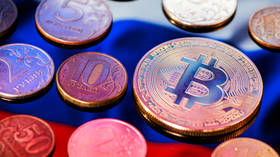The group’s members want to bypass “politicized” Western platforms, Anton Siluanov has told RT
The BRICS countries are working to create their own international payments system as platforms which operate using Western infrastructure are becoming increasingly politicized, Russian Finance Minister Anton Siluanov told RT in an exclusive interview with RT Arabic on Thursday. The unprecedented sanctions campaign against Moscow spearheaded by the US has forced Russia and other members of the economic group to look for ways to pursue trade despite the restrictions.
The new cross-border payment infrastructure will be based on new technologies and will enable faster and cheaper foreign trade transactions that are free from external interference, Siluanov said.
”Our task is to create our own independent system, given the… largely political decisions of the West,” said the minister, referring to the work undertaken by BRICS finance ministries and central banks.
”BRICS…is beyond politics, beyond any pressures and restrictions. Its aim is to stimulate economic growth and boost the income of our citizens,” the minister explained. The new system will use national currencies and digital currencies, added Siluanov.
Russia’s leading banks were excluded from the SWIFT international payment system starting in 2022 as part of sweeping sanctions imposed on Moscow by the West over the Ukraine conflict.
Russian President Vladimir Putin announced last month that the BRICS member countries were jointly developing a payment and settlement framework to be used for trading within the bloc.
Russia is the current chair of BRICS; the other countries include Brazil, India, China and South Africa, as well as new members Iran, Egypt, Ethiopia and the UAE, which joined in January.
Russia will host the bloc’s annual summit later this month. The members are slated to approve a new status within the group – that of a BRICS partner country. More than 30 nations, including NATO member Türkiye, have applied to join the economic bloc.
According to Siluanov, the BRICS countries will continue to reduce the share of the US dollar in mutual settlements in favor of national currencies, and also introduce digital financial assets in the future.
President Putin said in July that the pilot launch of the digital ruble, an electronic form of Russia’s national currency, had been successful. The Central Bank expects to expand the circulation of the digital ruble in July 2025.
Russian media reported last month that the country’s financial authorities were moving towards adopting crypto-currency for international trade. The head of the Russian Central Bank, Elvira Nabiullina, previously said that the regulator would conduct the first cross-border crypto payments by the end of the current year.
More than 95% of mutual settlements between Russia and its biggest trading partner, China, are carried out using national currencies (the ruble and yuan), Russian Prime Minister Mikhail Mishustin said in August.



